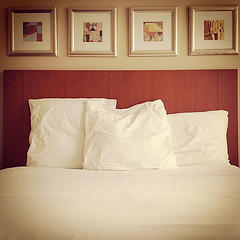You probably know the exact amount of time your favorite tee or trusty pair of jeans can go between washes, but can you say the same for your bedding? If you're confused about how often you should be changing your sheets, check out our handy guide below.
Sheets
Because we come in contact with our bedding on a daily basis, it's important to maintain a regular laundering schedule. Sheets should be changed every one to two weeks, or more often as needed. Wash sheets in the warmest temperature allowed by the fabric. Adding a quarter cup of lemon juice to the wash water is a natural way to bleach white sheets.
Pillows
Pillowcases should follow the guidelines of sheets. Pillow covers, like those that prevent allergies, should be washed twice per month, while the pillow itself should be tossed in the wash at least twice per year. Washing two pillows together can help keep the washer balanced. Run the pillows through the rinse cycle twice, then dry them in the dryer until no moisture remains; dampness can lead to mold.
Comforters
As with any bedding that comes in direct contact with the body, duvet covers and decorative quilts should be washed weekly. However, if your comforter is encased by a duvet cover, then the comforter itself only needs to be washed as you see fit. Be sure to use an industrial-sized washer equipped to handle the weight of a heavy comforter.
Is this the schedule you follow? Any tips for breezing through laundry day? Let us know!
Bedding Care 101 [Martha Stewart]
The Importance Of Washing Bed Sheets Regularly [Symptom Find]
The When-to-Wash-It Handbook [Real Simple]
How Often Should I…? [Quick and Dirty Tips]


 Equal Housing Opportunity
Equal Housing Opportunity